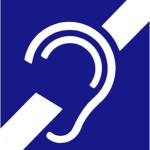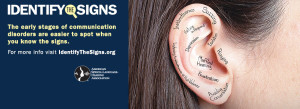Are You Hard of Hearing?
 Did you know that millions of Americans experience hearing loss in at least one ear? It seems to be true for me, too. I am in a crowded room with lots of noise in the background while trying to carry-on a conversation with my spouse or my colleagues. I am watching their mouths carefully (reading their lips) because I am not getting all the words! I seem to miss some words which affects the content of the message but I’m too embarrassed to ask them to repeat it again! This only happens when there is a lot of background noise.
Did you know that millions of Americans experience hearing loss in at least one ear? It seems to be true for me, too. I am in a crowded room with lots of noise in the background while trying to carry-on a conversation with my spouse or my colleagues. I am watching their mouths carefully (reading their lips) because I am not getting all the words! I seem to miss some words which affects the content of the message but I’m too embarrassed to ask them to repeat it again! This only happens when there is a lot of background noise.
Hearing loss is among the most common conditions affecting Americans especially older ones. In fact, according to an AARP-ASHA poll that was taken in 2011, a significant percentage of baby boomers have untreated hearing loss. Hearing and balance issues are also risk factors for falls—a serious concern for the older population—that may result in significant injury or death.
Hearing disorders are complex conditions with medical, psychological, physical, social, educational, and employment implications. They should be diagnosed and treated by an audiologist. Treatment options include hearing aids and other assistive technologies that meet a host of different medical needs and preferences, as well as aural/audiologic rehabilitation. Although many people may think of hearing aids as the singular answer to hearing issues, other interventions may be appropriate. This is why receiving a comprehensive evaluation by an audiologist is essential.
Many people have outdated perceptions of hearing aids (and hearing loss in general) that may lead them to delay treatment for years or forgo it altogether. Among adults ages 70 and older with hearing loss who could benefit from hearing aids, fewer than one in three (30%) have ever used them. Even fewer adults ages 20 to 69 (approximately 16%) who could benefit from wearing hearing aids have ever used them, according to the National Institute on Deafness and Other Communication Disorders. Untreated hearing loss is associated with anxiety, depression, reduced quality of life, and even earlier onset of dementia—all of which support the critical importance of early diagnosis and treatment.
Here are some tips to help make the communication process easier for a person who may be have hearing challenges.
• Reduce the background noises that may be distracting, close the door, or move to a quieter place.
• Stick to a topic and let the person know when you want to change topics..
• Allow extra time for responding.
• Be an active listener. Look for hints from eye gaze and gestures.
 Be sure to always face your colleague when you are speaking to so that he/she has full view of your mouth and can read your lips.
Be sure to always face your colleague when you are speaking to so that he/she has full view of your mouth and can read your lips.
Here is a site to help you identify the signs of hearing loss. For myself, I believe that it is time to schedule an appointment to see what is going on and what can be done in noisy spaces. I will keep you updated!
